No products in the cart.

How Seafood Can Boost Your Immune System as You Start the New Year
Starting the new year with seafood can seriously boost your immune system! Packed with omega-3 fatty acids, proteins, and essential vitamins like A and D, seafood helps your body fight off those annoying colds and flu. It reduces inflammation, allowing your immune cells to do their job more efficiently, while nutrients like zinc and iron support your body's defenses. Plus, it's delicious! So why not mix in some salmon or shrimp into your meals? By making seafood a regular part of your diet, you'll see the benefits soon enough. Curious about the best ways to incorporate it?
Contents
hide
Key Takeaways
- Regular seafood consumption provides essential omega-3 fatty acids, improving immune cell function and reducing inflammation in the body.
- Seafood is rich in vital vitamins, such as A and D, which enhance immune response and support overall health.
- Nutrient-dense seafood like oysters and crab supplies zinc, crucial for T-cell development and antibody production.
- Incorporating seafood into your diet can aid recovery from illnesses, promoting long-term health benefits.
- Aim for at least two servings of seafood weekly to maximize immune support and overall well-being.
Importance of Immune Health

Your immune health plays an essential role in protecting you against disease-causing microorganisms. Think about it: your body's defense system is like a superhero squad, battling bacteria, viruses, and even those pesky cancer cells. When your immune resilience is strong, it keeps you safe from illnesses like the flu and colds, allowing you to live your life freely and fully.
But it's not just about fighting off the bad guys. A robust immune system also helps prevent chronic inflammation, which can sneak up on you as you age. Chronic inflammation is like that unwanted guest who overstays their welcome, leading to various diseases. By reducing inflammation, you're not just staving off illness; you're also embracing holistic wellness, which means your mind, body, and spirit are all in harmony. Healthy lifestyle choices significantly influence your immune health, making it essential to adopt habits that support your body's defenses. Notably, studies indicate that inflammatory age serves as a better predictor of health outcomes than age alone. Moreover, incorporating nutrient-rich fish into your diet can provide essential omega-3 fatty acids that support immune function.
Have you ever considered how your immune health impacts your overall well-being? A well-functioning immune system promotes healing and recovery, ensuring you can keep moving through life, whether that's walking, dressing, or simply enjoying your favorite activities.
It's intertwined with your heart health too—high inflammatory scores can lead to serious cardiovascular issues.
Role of Omega-3 Fatty Acids

Omega-3 fatty acids play a significant role in supporting immune health, acting as powerful allies in the body's defense system. You mightn't realize it, but these fundamental fatty acids are essential for your immune cells, as they become integral parts of your cell membranes. When you include omega-3s in your diet, you're fundamentally enhancing the functionality of these immune warriors. Think of it as giving your immune cells a little upgrade!
These fatty acids help remodel the cell membranes, especially in T-cells, which are critical for immune modulation. By incorporating omega-3s, you guarantee these cells can communicate effectively and respond to threats without overreacting. Isn't it amazing how a simple dietary change can create such a balanced inflammatory response? It's like having a skilled conductor guiding an orchestra, making sure each note is just right.
But that's not all! Omega-3s also reduce the production of inflammatory substances that can wreak havoc on your body. They even help in producing specialized pro-resolving mediators that assist in winding down inflammation when it's no longer needed. Additionally, they are known for their anti-inflammatory properties, which can significantly aid in controlling chronic inflammation. Research has shown that regular seafood consumption provides essential nutrients that further enhance immune function.
This means omega-3s not only help in preventing chronic inflammation but also support recovery from acute immune responses.
Benefits of Protein in Seafood
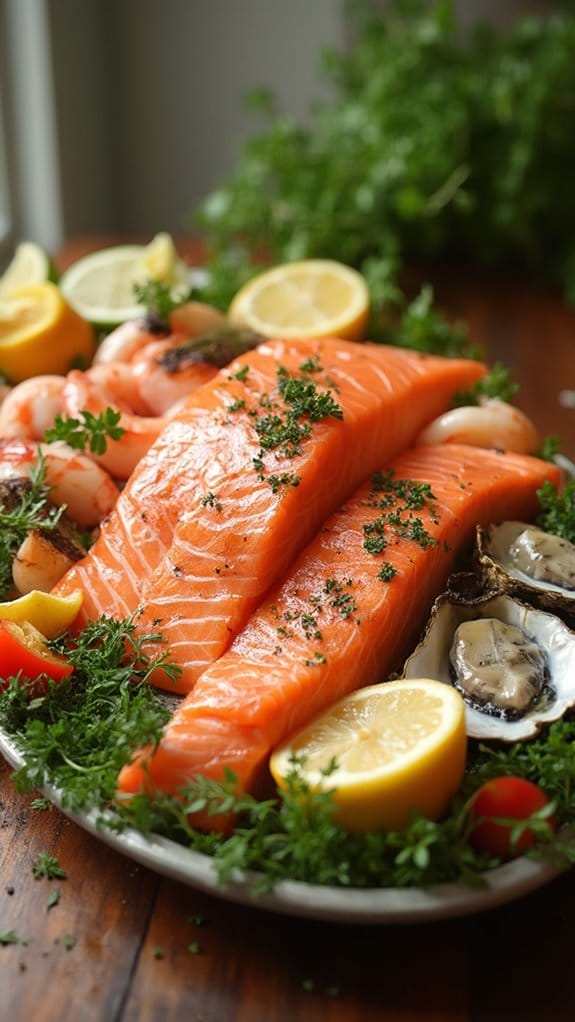
A significant benefit of including seafood in your diet is its rich protein content, which serves as a complete source of essential amino acids vital for your health. Whether you're munching on a piece of salmon or slurping up some shrimp, you're getting high-quality protein that supports everything from muscle maintenance to immune function. Who wouldn't want that?
Seafood varieties like trout, flounder, and tilapia are lean protein sources packed with nutrients, making them fantastic choices for those seeking a healthier lifestyle. These proteins act as the building blocks of your body, important for tissue repair and cell regeneration. Moreover, this nutrient-rich food can enhance immune cell function due to its high protein content. Additionally, seafood is a rich source of omega-3 fatty acids, which have anti-inflammatory properties that further support your immune system.
Plus, they play a pivotal role in developing immune cells, which are your body's first line of defense against illness. Imagine biting into a juicy piece of tuna. Not only are you treating your taste buds, but you're also fueling your body with what it needs to fight off infections.
With seafood, you can enjoy delicious meals while keeping your health on track. And let's face it—eating seafood is a great way to switch things up in your diet.
Vitamin A and Immune Function
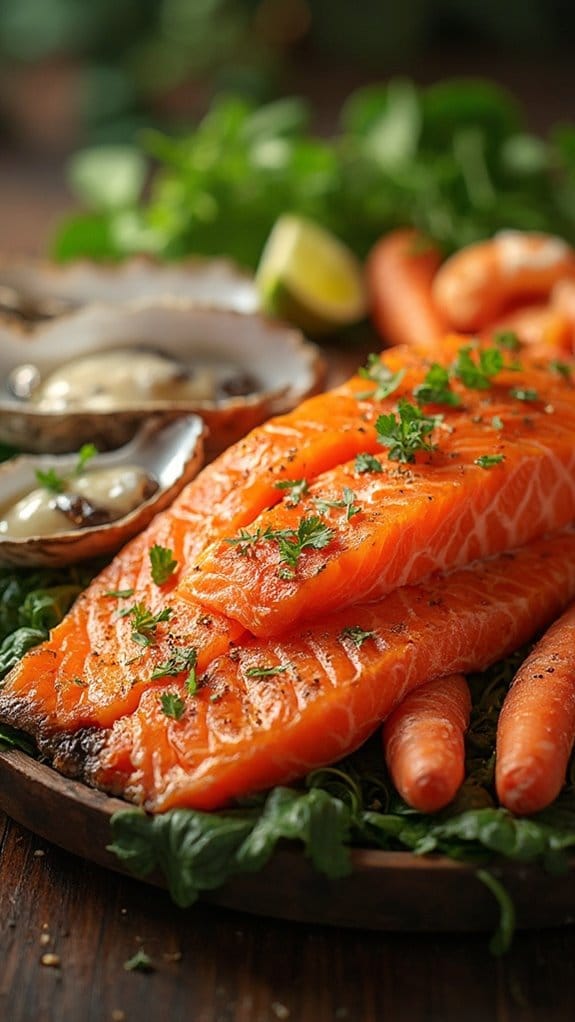
Including seafood in your diet not only boosts protein intake but also provides essential nutrients like vitamin A that enhance your immune function. You might be wondering how one nutrient can pack such a powerful punch for your health. Well, vitamin A plays a significant role in immune enhancement by supporting immune cell function and maintaining mucosal integrity. It helps your body produce antibodies and promotes the growth of immune cells, ensuring they're ready to tackle any invaders. Furthermore, vitamin A deficiency can lead to increased susceptibility to infections, which highlights the importance of adequate intake.
But that's not all! This vitamin also restores the health of your mucosal surfaces, which can be damaged by infections. Think of it as a repair crew, fixing the barriers that protect your body. Without enough vitamin A, those barriers can falter, leading to impaired immunity and increased vulnerability to infections. Incorporating seafood into your meals also provides omega-3 fatty acids, which further supports your immune system and overall health.
That's why including seafood—like salmon or tuna—in your meals is so important. Not only do these delicious options provide vitamin A, but they also help regulate your immune system, keeping you safe and healthy. Imagine enjoying a tasty dish while knowing you're boosting your body's defenses. Pretty empowering, right?
Impact of Vitamin B on Immunity
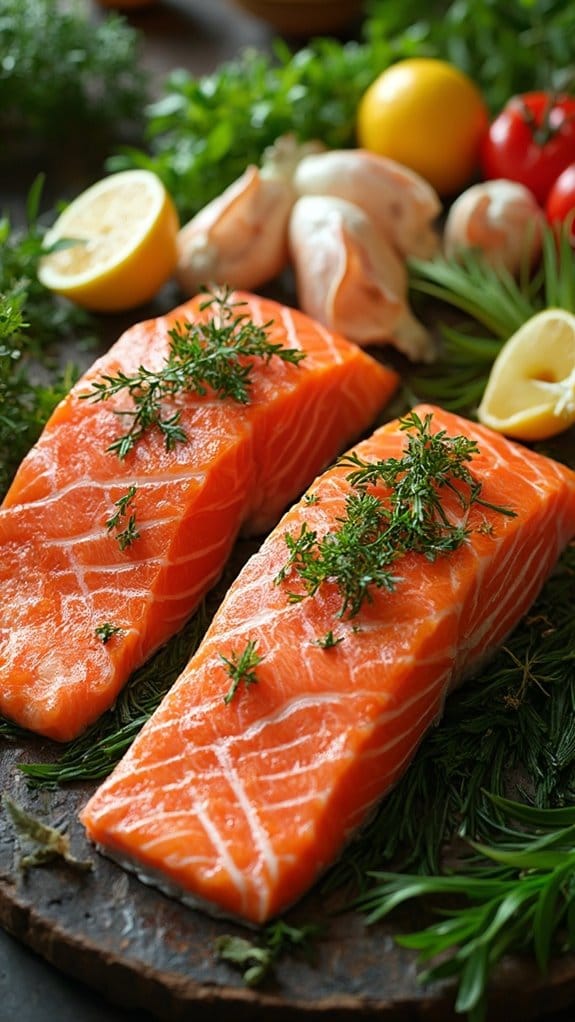
While many nutrients contribute to a strong immune system, the impact of B vitamins is particularly significant. You might be surprised to learn just how essential these vitamins are for your body's defenses. They help with everything from energy production to the creation of antibodies, which are your immune system's secret weapons against infections. Additionally, adequate B12 levels are necessary for optimal immune function, ensuring your body's defenses are fully equipped to fight off illness.
Take a look at this table to see how different B vitamins support your immunity:
| Vitamin | Key Benefits | Sources |
|---|---|---|
| B6 | Boosts antibody production | Fish, poultry, bananas |
| B12 | Aids red blood cell production | Seafood, meat, dairy |
| B2 (Riboflavin) | Acts as an antioxidant | Eggs, green leafy veggies |
| B3 (Niacin) | Supports cellular health | Fish, chicken, whole grains |
Vitamin B6 benefits are immense, especially when it comes to antibody production. This vitamin helps your body produce white blood cells, the guardians that fight off invaders like viruses and bacteria. Without enough B6, your immune response can weaken, leaving you more vulnerable to sickness. Additionally, B Complex vitamins particularly B5 and B6, help manage stress and inflammation, preventing them from damaging your immune system. So, if you're looking to enhance your immunity, consider adding seafood to your plate. Not only is it delicious, but it's also a fantastic source of these essential vitamins. Who knew staying healthy could taste so good?
Significance of Vitamin D

Vitamin D plays an essential role in supporting your immune system, complementing the benefits of B vitamins. You might be surprised to learn that this vital nutrient helps regulate your immune cells, like neutrophils and macrophages, keeping them primed to fight off infections.
By stimulating the production of antiviral peptides, vitamin D enhances your innate immune response, while also modulating the adaptive side, which includes those important T cells and B cells. So, when you're thinking about your health, why not consider how vitamin D synthesis from seafood can make a difference?
Eating fatty fish like salmon, sardines, and tuna isn't just a treat; it's a powerful way to boost your vitamin D levels. In fact, regular seafood consumption—two or more servings a week—can help you maintain adequate levels and keep your immune system functioning effectively.
A deficiency in vitamin D can leave you more susceptible to infections, and no one wants that, right?
Furthermore, studies show that adequate vitamin D levels can reduce the risk of respiratory infections and even severe outcomes from illnesses like COVID-19. Imagine having a stronger defense against those pesky winter colds!
Essential Minerals for Immune Support
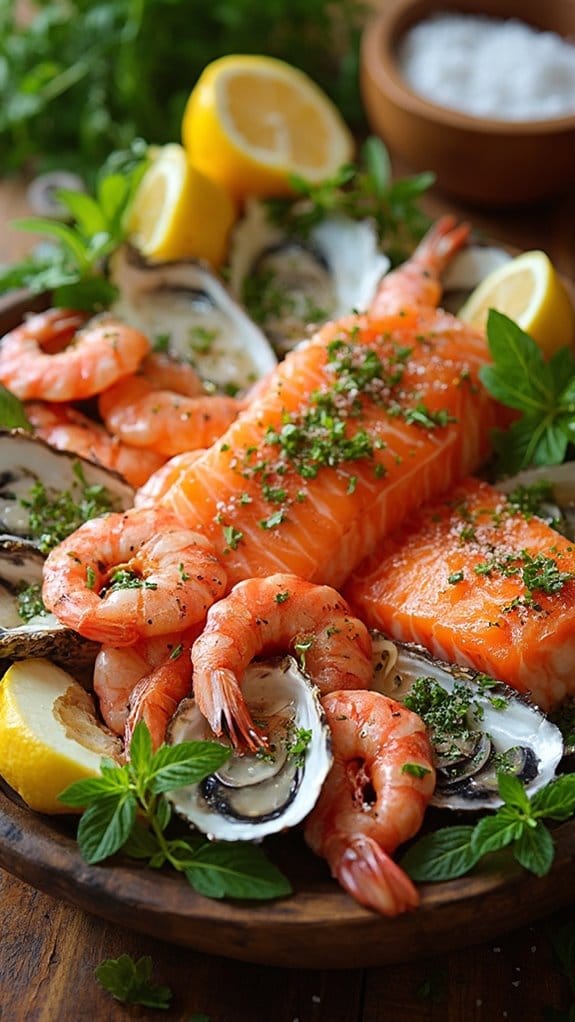
When it comes to bolstering your immune system, essential minerals found in seafood play a significant role. You mightn't realize it, but the zinc benefits from seafood can greatly impact your health. For instance, oysters, crab, and lobster aren't just delicious; they're rich in zinc, which is critical for T-cell development and function. This little mineral helps your body produce antibodies and supports wound healing, giving you a better shot at fighting off those pesky viruses and bacteria.
Now, let's talk about iron sources. Shellfish, clams, and mussels are packed with iron, particularly in its heme form, which your body absorbs easily. Iron is essential for synthesizing proteins and transporting oxygen, and it's indispensable for producing T lymphocytes—those warriors of your immune system.
Imagine a world where your muscles and immune cells are thriving; that's what iron can help you achieve!
And let's not forget about copper, found in shellfish and crustaceans. It's another heavy hitter for T cell proliferation and antibody production. By incorporating these seafood essentials into your diet, you're not just eating well; you're empowering your immune system to be its best self.
Antioxidant Properties of Seafood
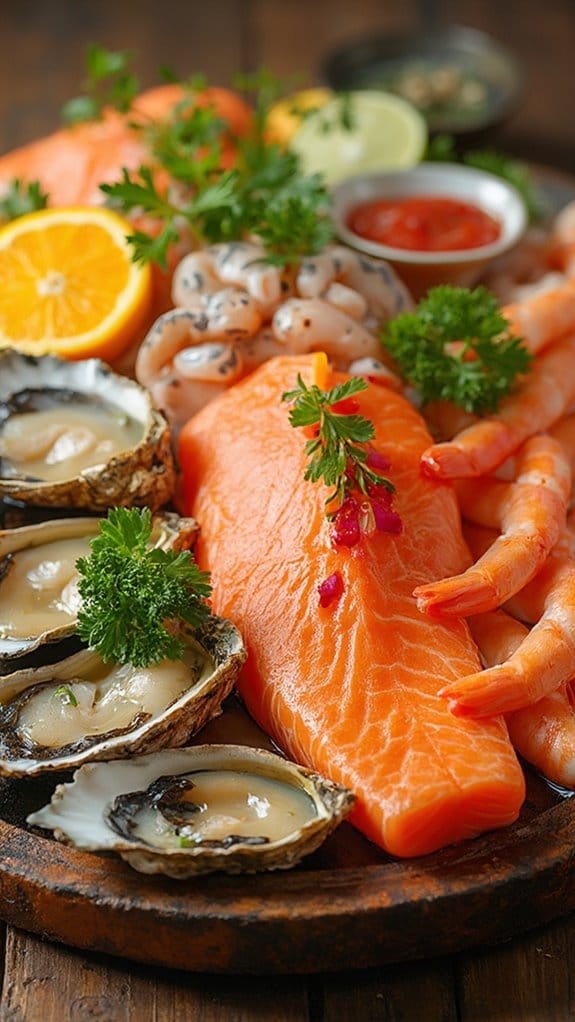
Seafood doesn't just provide essential minerals for immune support; it also boasts impressive antioxidant properties that can enhance your overall health. You might be surprised to learn that certain seafood varieties are packed with significant vitamins and minerals that act as powerful antioxidant sources.
For instance, fatty fish like salmon and sardines are rich in vitamin D. This vitamin not only supports your immune system but also helps keep infections at bay. Who knew a tasty dinner could do so much?
When you indulge in seafood, you're also treating yourself to a variety of B vitamins. These guys play an important role in reducing inflammation and promoting healthy blood cells.
And let's not forget selenium and zinc! These minerals, found in shellfish like oysters and clams, help lower oxidative stress and boost immunity. It's like a little armor for your body!
Now, let's talk omega-3 fatty acids. Found in fish like mackerel and trout, these nutrients aren't just about heart health. They can actually regulate your immune response!
How Seafood Reduces Inflammation

An impressive way to combat inflammation is by incorporating seafood into your diet. You might wonder how this works, so let's explore the details. Seafood varieties, especially those rich in omega-3 fatty acids like EPA and DHA, can greatly reduce inflammation. These powerful nutrients help your immune cells function better and can even dial down the inflammatory response when it gets a bit too excited.
Inflammation research shows that omega-3s not only remodel cell membranes but also lower the production of pro-inflammatory substances in your body. Imagine having fewer swollen joints or less discomfort from chronic conditions like arthritis. Sounds appealing, right?
Plus, these fatty acids boost the activity of white blood cells, essential for keeping your immune system in tip-top shape.
But that's not all! Seafood is packed with vitamins A, B, and D, as well as minerals like selenium and zinc, all of which have anti-inflammatory properties. For instance, vitamin A helps keep your respiratory tissues healthy, while zinc supports wound healing.
To reap these benefits, aim for at least two servings of seafood per week. Whether you enjoy salmon, tuna, or even some tasty shellfish, you'll not only savor delicious meals but also give your body a fighting chance against inflammation.
Supporting Gut Health With Seafood

Regularly incorporating seafood into your diet can greatly support gut health. You might be surprised to learn how seafood varieties can enhance your gut microbiota! The omega-3 fatty acids found in fish, such as DHA and EPA, work wonders. They not only boost the diversity of good bacteria in your gut but also help keep the bad ones in check.
So, how does this all work? Here are a few key benefits:
- Increased Diversity: Omega-3s promote the growth of beneficial bacteria, enhancing the variety of your gut microbiome.
- Reduced Inflammation: These essential fats help lower inflammation, making your gut a happier place overall.
- Essential Nutrients: Seafood is packed with vitamin D, B12, and zinc, all vital for maintaining a healthy gut lining.
- Prebiotic Fibers: Some seafood, like shrimp and crab, contain prebiotic fibers that feed your good bacteria.
Seafood and Tissue Repair

Incorporating seafood into your diet can play an important role in tissue repair and recovery. You might wonder how that works, right? Well, seafood is packed with nutrients that promote tissue regeneration. For instance, the omega-3 fatty acids found in fish like salmon and sardines have fantastic anti-inflammatory properties. They can help reduce inflammation and increase collagen synthesis, which is essential for healing.
However, keep in mind that while omega-3s can be beneficial, too much can sometimes hinder wound healing, especially if you're diabetic.
But wait, there's more! Seafood is also a fantastic source of high-quality protein. This protein is important for your body to heal and recover effectively. It fuels your immune system, helping you fight off infections while also supporting the production of proteins and DNA. That's like giving your body a power-up!
Don't forget about vitamins and minerals! Vitamin A, found in oily fish, is a superstar for keeping your skin and respiratory tissues healthy. Nutrients like iodine, magnesium, and zinc in various seafood sources are crucial for metabolic activity and immune response. They all work together to support overall tissue health and repair.
Incorporating Seafood Into Your Diet

When it comes to boosting your immune system and overall health, seafood should definitely be on your plate. Incorporating seafood into your diet doesn't have to be a chore. With just a little meal prep, you can enjoy a variety of seafood that's not only delicious but also packed with nutrients. Here's how you can get started:
- Choose the Right Seafood Varieties: Opt for fatty fish like salmon and mackerel for omega-3s, or shellfish like oysters and scallops for vitamin B and zinc. Lean fish like tilapia are also great options.
- Quick Meal Prep: Use canned seafood like tuna or smoked salmon. They're perfect for quick lunches or snacks when you're short on time.
- Get Creative with Recipes: Think of fun meals! Try making sushi with fresh fish, or top your salads with grilled shrimp for an extra protein kick.
- Cook Smart: Broil, bake, or roast your seafood to keep those nutrients intact. A little seasoning can go a long way in enhancing flavor.
Frequently Asked Questions
How Often Should I Eat Seafood for Immune Benefits?
You should aim for a weekly intake of seafood at least twice a week for those immune benefits.
Think about it: mixing up your seafood variety not only keeps meals exciting but also packs in essential nutrients.
From omega-3s in salmon to zinc in oysters, each type brings something special to your plate.
So, why not plunge in and enjoy the flavors while boosting your health?
Your body will thank you for it!
Can Seafood Help With Seasonal Allergies?
Seafood can really help with seasonal allergies? Absolutely!
Seafood benefits include omega-3 fatty acids, which can provide allergy relief by reducing inflammation and regulating immune responses.
You'll find that eating fish like salmon or sardines not only tastes delicious but also supports your body's defenses against pesky allergens.
Is There a Risk of Mercury in Seafood?
Imagine diving into a sea of delicious seafood, but wait—are you aware of mercury toxicity lurking beneath the surface?
High-mercury fish can harm your health, especially if you're pregnant or have kids. To enjoy seafood without worry, follow seafood guidelines: stick to lower-mercury options like shrimp and sardines.
Check local advisories too. Why risk your health when you can savor the flavors safely? Eating smart lets you enjoy freedom without fear!
What Are the Best Seafood Options for Vegetarians?
If you're looking for seafood alternatives as a vegetarian, you've got exciting options!
Try BeLeaf's vegan shrimp or Gardein's fishless filets in your favorite vegetarian recipes. They're easy to cook and packed with flavor.
How about a tasty tuna spread from Jinka? It's perfect for dips or sandwiches.
With these plant-based choices, you won't miss the ocean one bit!
Why not plunge into a new recipe and explore these delicious options?
How Should Seafood Be Prepared to Retain Nutrients?
Ever wonder how to keep your seafood nutritious and delicious? To retain nutrients, try grilling methods that avoid excessive charring or opt for steaming benefits, which preserve delicate vitamins.
Keep cooking times short and temperatures moderate; you'll be amazed at how much flavor and nutrition you can keep!
Conclusion
So, as you plunge into the new year, why not let seafood be your superhero? Packed with omega-3s, protein, and vitamins, it's like a multivitamin that swims! Think about it—while others are downing sugary snacks, you'll be nourishing your immune system. Isn't it great to know that those shrimp cocktails and salmon fillets aren't just tasty but also fighting for your health? So, grab a fork and get ready to make your immune system a champion!

